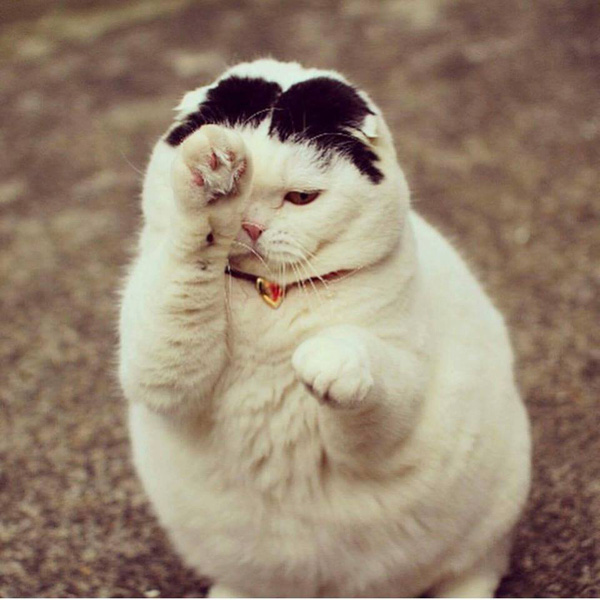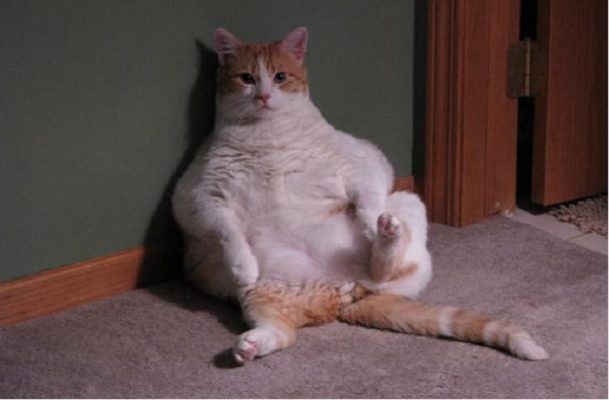How to take care of a fat cat is not simple because cats are quite picky eaters. There is a saying "eat like a cat" because cats eat less. If you encounter a difficult cat, it will be even more difficult. And having a fat cat is one thing, it's more important to be healthy. In this article, we will learn how to take care of a fat cat for a chubby cat quickly and still be healthy.
1. How to take care of a fat cat by providing enough water

Many studies have shown that, as long as cats lose about 10% of body water, they will be at risk of electrolyte disorders and systemic dysfunction.
So water is extremely important for cats. Every day you need to ensure adequate water for them. Depending on the weather and the intensity of the cat's activity, the average cat needs from 60-80ml of water / kg of body weight. You can give your cat water directly or add water to the cat's powdered food.
2. How to take care of a fat cat: Feed your cat full fat
The fastest way to take care of a fat cat is to give the cat enough fat. This is an important substance to help cats quickly lose weight. Fat provides an abundant source of energy and makes food taste better, stimulating the cat's taste buds.
In addition, fat also provides fat-soluble vitamins such as vitamins A, D, E, and K. Not only helps cats gain weight, but also helps cats own a shiny and healthy coat.
3. Cats who want to be fat and healthy need to be provided with enough protein
Many studies show that protein is a key factor in building strong muscles and rebuilding cells for animals, including cats. Protein is usually found in meat, vegetables, cereals, milk, etc.
Proteins from these foods all have different structural compositions. Therefore, in order for your cat to absorb the necessary proteins, it is necessary that you provide all these foods in a reasonable way in your cat's daily diet.
The most important proteins are:
- Taurine: This is one of the most important amino acids found mainly in meat and almost absent in plants. A lack of taurine in cats can cause central retinal degeneration, leading to irreversible blindness, as well as heart failure. This is why it's so important to add taurine to your cat's diet.
- Arginine: Like Taurine, the cat's body cannot synthesize this substance, we must supplement them from food every day. Arginine plays an important role in cell division and wound healing, the body's immune function, and the removal of ammonia from the cat's body.
animal-meow-animal-tu-protein
Cats have to regulate enzymes for the digestion of proteins, so if a cat has a protein deficiency, its enzymes will break down the cat's own muscles, making them increasingly thin. Therefore, a sufficient protein diet is very important when raising fat cats. In particular, cats that eat too much protein are only excreted in the urine without causing serious harm.
4. How to take care of a fat cat: Eat enough Carbohydrates

Carbohydrates are substances that contain carbohydrates and cats need to consume starch for energy. Starch is found in rice, cereals, etc., so to make your cat fat quickly, mix protein and fat foods with rice so that your cat can eat better.
However, cats do not need too many carbohydrates in their daily diet. Because if cats eat too much carbohydrate can cause obesity. Especially old cats need to eat less carbohydrates to avoid cardiovascular diseases or diabetes.
5. Vitamins – For cats to get fat fast and still be healthy
In cats, vitamins are divided into 2 types: Fat-soluble vitamins (A, D, E, K) stored in adipose tissue and liver and then slowly excreted if in excess, and water-soluble vitamins (B, C).
Because cats can synthesize vitamin C in sufficient quantities for them to grow healthier and fatter faster, you do not need to provide vitamin C to your cat.
6. Minerals – maintain your cat's health and weight
Minerals are essential for maintaining a cat's health and weight. Calcium and Phosphorus play an important role in bone building and help keep bones strong. Other minerals help cats maintain their immune system, cells, red blood cells, healthy skin, and more.
Experts from the American Dietetic Association Feet (AAFCO) have recommended that to raise fat and healthy cats, regular supplements of substances such as calcium, phosphorus, magnesium, potassium, sodium chloride, iron, copper, etc. manganese, zinc, and iodine into the cat's daily diet.
7. Fiber – Good for the cat's intestinal and digestive system
Cats are carnivores, so fiber is not really necessary for cats. However, if you want your cat to grow up healthy, you still need to include a small amount of fiber in their diet. Because this is very good for the cat's intestinal and digestive system, it helps to prevent constipation and let the cat have better health, gain weight faster.
Typically, some fiber ferments in the cat's digestive tract, increasing the growth of beneficial bacteria in the cat's intestines.
Here is some information about how to take care of a fat cat that we want to share with you. Wish you have healthy and chubby cats. If you need to know more about other ways to take care of fat cats, please contact http://vanchuyenchomeo.com/ for advice.